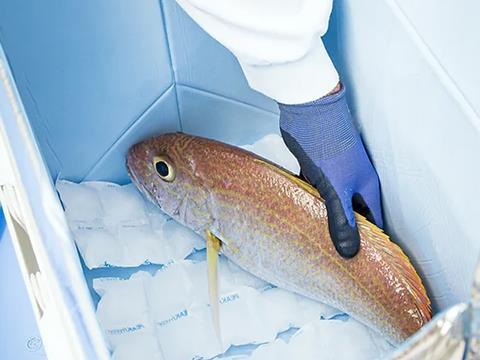
Credit: TomKat Global Solutions
Many perishable food industries rely on polystyrene boxes for transport to keep their products safe. While they are cheap, lightweight, and thermally effective, they are designed for single use only and can represent a threat to the environment.
The seafood industry in particular is responsible for approximately half a billion single-use polystyrene fish boxes entering landfills and polluting the oceans every year.
To reduce the use of polystyrene in the industry and provide more transparency throughout the transportation process without sacrificing cost efficiency and thermal performance, the Australian company TomKat Global Solutions has developed its own packaging system: the TomKat KoolPak.
The KoolPak is a durable, lightweight, thermally insulated container that consists of three replaceable components: lid, base, and thermal liner. Each of these components has been fitted with a battery-less NFC temperature sensor tag developed by Taiwanese RFID specialist Securitag Assembly Group (SAG) which allows for the scanning of the temperature without the need to open the lid, which simultaneously provides tamper protection, they claim.
This ensures that the fresh goods in the KoolPak are genuine and have not been taken out and exchanged during transit and have not undergone a temperature excursion.
In tandem with software developed by LUK and gate scanning equipment provided by Feig Electronics, clients can monitor each container through every step of the supply chain, prove its provenance and ensure the safety and freshness of its content at any time, says the company.
From the beginning of their cooperation, TomKat’s NFC requirements focused on a battery-less temperature sensor tag. The challenges for SAG were threefold: The mobile phone was intended to be the primary reading device; Multiple layers of material were to be read through; This was clearly a no-battery application.
TomKat evaluated other alternatives to NFC such as QR codes and barcodes. However, only NFC provides an effective way of registering the three KoolPak components as an assembled unit to a database or blockchain in battery-less form.
To retrieve information about the contents of the box, clients need to download the KoolPak app on their smartphone. This blockchain tracking and traceability function has the potential to provide data along the entire supply chain from producer to retailer.
The company believes KoolPak’s greatest asset is its sustainability. Life cycle analysis shows that each container can be used more than 10 times, with some trials yielding an even greater number of re-uses of up to more than 20 times.
This means that with just a few uses, it becomes cost equivalent to a comparatively cheaper polystyrene box, which can only be used once.
Even at the end of its life cycle, over 90% of the material can be recycled into a new container, leaving only a very light footprint on the manufacturer’s side. This includes the NFC sensor tags, which can be removed and reattached to new KoolPaks, explains TomKat founder Tom Long.
The temperature monitoring function provides an incentive for clients to keep track of their boxes at all times and to make sure that they are returned for recycling after they have finished their rotational re-uses.
This article was created in collaboration with AIPIA (the Active and Intelligent Packaging Industry Association). Packaging Europe and AIPIA are joining forces to bring news and commentary about the active and intelligent packaging landscape to a larger audience. To learn more about this partnership, click here.














No comments yet